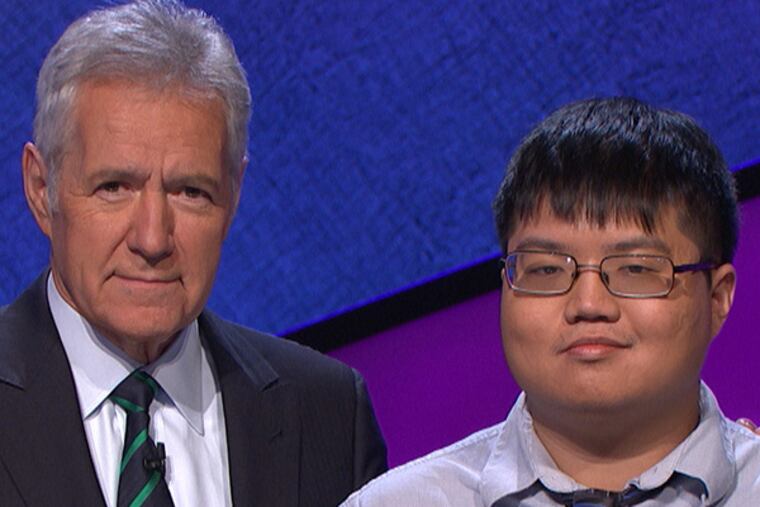'Jeopardy!' tie game makes Arthur Chu a hero?
The Swarthmore alum bet to let another player also win $26,800.

Wednesday night, something rare happened on Jeopardy!
A player bet to allow a tie, letting another contestant also get a big payday.
To some Jeopardy! fans that makes Arthur Chu a hero.
"Tonight was my favorite episode of @Jeopardy that I can remember. Doing something nice for someone else is where you can find happiness," tweeted @averageheather.
"So happy to see someone playing game theory correct on Jeopardy. Totally nerded out after you bet to tie. You're awesome!" tweeted @CraigMacn.
Carolyn Collins must be grateful, too, since she returned for today's show $26,800 richer, instead of out the door with $2,000, the runner-up money. Chu also gets $26,800, on top of the $37,200 he won Tuesday.
[Thursday update: Chu won today's game in a runaway, adding $18,800 for a three-day total of $82,800. Finishing second was Philadelphia's Maura McKenna, who alone was correct in Final Jeopardy, responding that Julia Louis-Dreyfus passed Lucille Ball for most-ever Emmy nominations.]
Wednesday's game was a wild one, where Chu went down to zero during Double Jeopardy after missing a Daily Double, only to surge back into the lead before the ultimate wager.
In Final Jeopardy, Collins bet all she had -- $13,400 -- and knew that La Paz, Bolivia, is one of the two world capitals ending in Z. (The other: Vaduz, Liechtenstein.) (See all the A's and Q's at J-Archive.com.)
Chu, who had $18,200, bet $8,600, and also wrote La Paz.
The tie result stood out in stark contrast to a far more common scenario: The player with the most greedily tacks on an extra buck, letting only one person get the glory and the max cash -- while the show buttresses its bottom line.
Chu, however, denied by phone this morning that he was being humanistic. And no, he wasn't trying to spark some interest from an attractive woman, as some have suggested.
The Ohio insurance compliance analyst, who does freelance voiceovers, said he's happily married to Eliza Blair, a fellow grad of Swarthmore College.
He pointed out that his bet on Tuesday's show also allowed a tie, but the next contestant didn't come up with "the fountainhead" to complete an Ayn Rand quote.
Also off-base was a tweet that asserted "he got cocky and assumed she would bet to keep $1 if wrong like everyone on jeopardy."
The game theory idea was right.
"I'll be honest. I outsourced my wagering decision-making to this blog," Chu said.
That is, while prepping for the show, he studied the advice of a former college champ, whose The Final Wager website is devoted to analyzing Jeopardy!'s concluding bets.
After hearing that Chu studied his advice, Keith Williams (below) created a YouTube video explaining why he "always" recommends betting for a tie, for two reasons.
"Tacking on that extra dollar won't help you, but if you're wrong, you could lose a game by a dollar, and there have been several instances where that has been the case," he said.
That script suited Chu.
"I don't want to take any unnecessary risks," he said. "That's just my personality. I always play very defensively."
Williams' second reason is more diabolical, more of a "mind game," to use his term. If an opponent knows you'll bet to allow a tie (as Chu did on Tuesday's show), that opponent is more likely to bet it all, hoping for that tie.
That drastically changes what happens if all the players are wrong. No. 2 would be wiped out, allowing No. 1 to win, as would have happened on Wednesday.
If Collins had bet more rationally, in the $3,400 to $3,800 range, she would have won if all three had been wrong, said Williams, a writer who lives in Brooklyn.
Suddenly win-win becomes sorry, you lose.
An argument can be made that compassion has its own kind of game theory. If you're nice to other people, they're more likely to be nice to you. How much love would the world have if we all wait for someone else to go first? Suppose Collins takes the lead tonight. Isn't she more likely now to repay the favor and let Chu tie?
"One would hope so," Chu said, who was sworn to secrecy about future games.
Of course, there are other complications, not the least of which is the category, Williams said.
Chu's Achilles heel, for example, seems to be sports. He bet only $5 when he landed on a Daily Double and had no clue that Eddie Giacomin, Herb Brooks and Conn Smythe made the hall of fame in hockey.
Perhaps you don't want to risk a particularly strong opponent coming back, although there are no guarantees an even better player might get that spot.
And isn't there a kind of logical loop about the best bet? If Collin's most rational bet was $3,400 to $3,800, wouldn't it be rational for Chu to risk $1,000 or less? But if it's rational for Chu to that little, doesn't that in turn change what's rational for Collins?
Starts to sound like rock, paper, scissors, with each if generating a new answer.
That's part of the mind games, Williams said.
"There's a lot of psychology happening in the background, which is why it's all very fascinating," he said.
Contact staff writer Peter Mucha at 215-854-4342 or pmucha@phillynews.com.